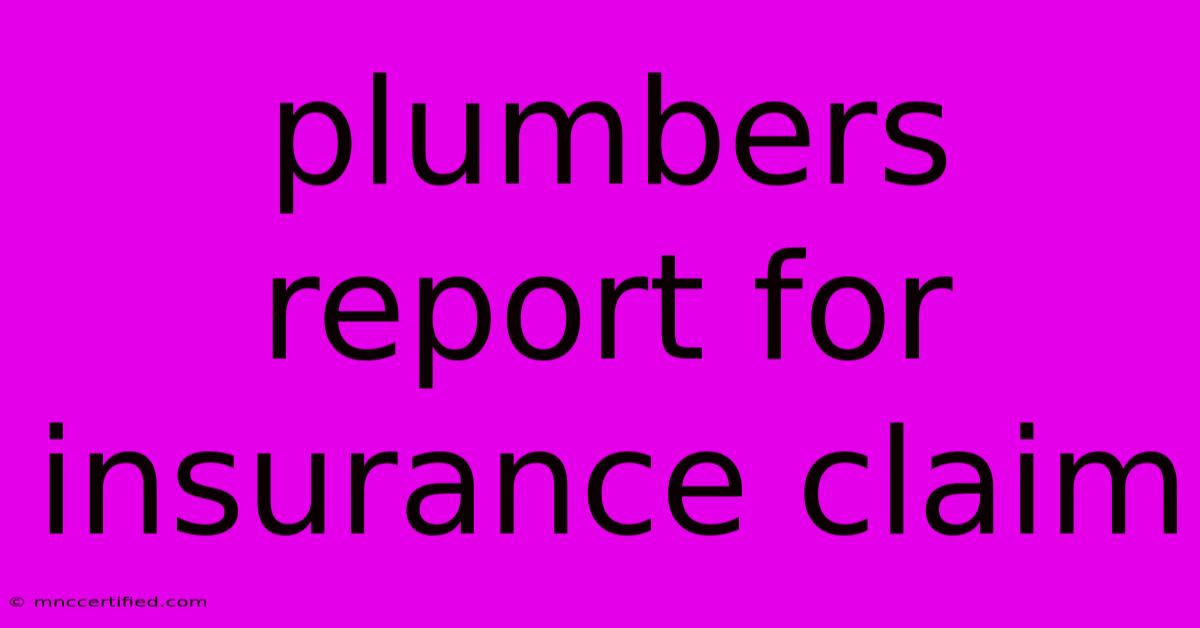Plumbers Report For Insurance Claim

Table of Contents
Navigating the Waters of Insurance Claims: Your Plumber's Report is Key
Dealing with a plumbing disaster is stressful enough, but navigating the insurance claim process can feel like wading through a murky swamp. A crucial step in ensuring your claim is successful is obtaining a plumber's report. This document acts as the foundation for your claim, detailing the damage and its cause, which is essential information for your insurance company.
Why is a Plumber's Report So Important?
Think of a plumber's report as a translator between the technicalities of plumbing and the language of insurance. It bridges the gap between your understanding of the problem and what your insurance company needs to evaluate your claim. Here's why it's so critical:
- Documentation of Damage: A detailed report provides a clear picture of the extent of the damage, including broken pipes, leaks, water damage, and any other related issues. This documentation becomes crucial evidence for your claim.
- Identification of Cause: The report outlines the root cause of the plumbing problem. This information helps your insurance company determine if the damage is covered under your policy. For example, a report might identify a burst pipe due to freezing temperatures, which would likely be covered, versus a leak caused by general wear and tear, which may not be.
- Supporting Documentation: The report acts as a credible source of information for your insurance company. It's backed by a professional's expertise and is more likely to be accepted than simply your own description of the problem.
What Should a Plumber's Report Include?
A comprehensive plumber's report should include the following:
- Date and time of service: This helps establish a timeline for the damage.
- Detailed description of the problem: This should be clear and concise, outlining the specific issue and the location of the damage.
- Photos or videos: Visual documentation is key. Pictures and videos provide irrefutable proof of the damage.
- Cause of the problem: This should be clearly identified and explained, including any contributing factors.
- Estimated cost of repair: The report should include an accurate estimate of the cost to repair or replace the damaged plumbing system.
- Recommendation for future prevention: A good report will also offer suggestions for preventing similar problems in the future.
How to Obtain a Plumber's Report for Your Insurance Claim
- Call a Licensed Plumber: Contact a licensed and insured plumber who is familiar with working on insurance claims.
- Request a Detailed Report: Make sure to explicitly ask for a detailed report that covers the information listed above.
- Review the Report: Thoroughly review the report to ensure it accurately reflects the damage and its cause.
- Submit the Report to Your Insurance Company: Provide the report to your insurance adjuster as part of your claim process.
By obtaining a thorough and detailed plumber's report, you'll strengthen your insurance claim and increase the likelihood of a successful resolution.
Additional Tips for Filing a Successful Insurance Claim:
- Take Clear Pictures: Document the damage yourself, including the surrounding areas, before any repairs are made.
- Save Receipts: Keep all receipts related to repairs, cleanup, and temporary housing.
- Communicate with Your Insurance Company: Keep them informed throughout the entire process, and always follow their instructions.
Remember, navigating the insurance claim process can be complex. By having a well-documented plumber's report, you'll have a solid foundation to build your case and increase your chances of a positive outcome.

Thank you for visiting our website wich cover about Plumbers Report For Insurance Claim. We hope the information provided has been useful to you. Feel free to contact us if you have any questions or need further assistance. See you next time and dont miss to bookmark.
Featured Posts
-
What Would Closing Education Department Mean
Nov 13, 2024
-
Prue Leiths Busy Bake Off Schedule
Nov 13, 2024
-
Scarlet Tanager Sighting Attracts Crowds In Halifax
Nov 13, 2024
-
Mike Huckabee New Us Ambassador To Israel
Nov 13, 2024
-
Commercial Condo Insurance Coverage
Nov 13, 2024